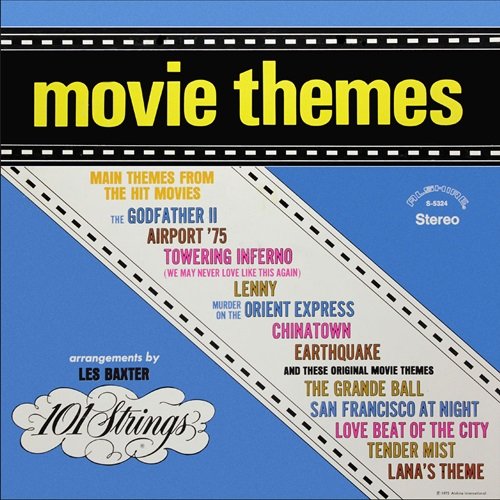George Petrou - Handel: Alesandro Severo & Manzaro: Don Crepuscolo (2011)
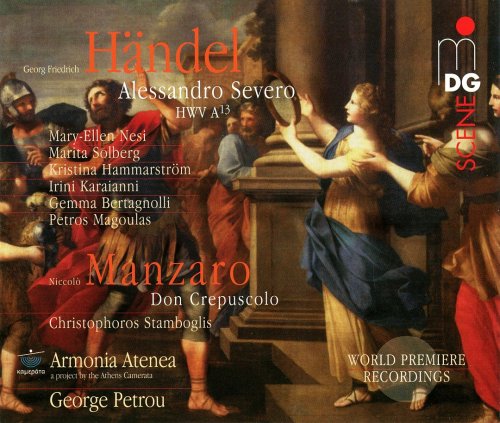
Artist: George Petrou
Title: Handel: Alesandro Severo & Manzaro: Don Crepuscolo
Year Of Release: 2011
Label: MDG
Genre: Classical
Quality: FLAC (image + .cue, log, scans)
Total Time: 3:06:54
Total Size: 948 MB
WebSite: Album Preview
Tracklist:Title: Handel: Alesandro Severo & Manzaro: Don Crepuscolo
Year Of Release: 2011
Label: MDG
Genre: Classical
Quality: FLAC (image + .cue, log, scans)
Total Time: 3:06:54
Total Size: 948 MB
WebSite: Album Preview
Disc 1
01 Atto Primo. Overtura
02 Menuetto
03 Coro: Viva Augusto, eterno impero
04 Recitativo: Augusto, sei del ciel
05 Aria: Lascio Gian', e sieguo Marte (Marziano)
06 Recitativo: Nunzio del Re de' Parti
07 Duetto: Non ho piu affanni no (Salustia, Alessandro)
08 Recitativo: Giulia non son
09 Aria: Lo sdegno del mio cor (Giulia)
10 Aria: Chi sa dirti o core amante (Albina)"
11 Recitativo: O dell' alta tua sorte
12 Aria: Zeffiretto che scorre nel prato (Albina)
13 Recitativo: Le suppliche vassale qui son raccolte
14 Aria: Che posso dir, o cara? (Alessandro)
15 Recitativo: E mi lascia?
16 Aria: Un vostro sguardo (Salustia)
17 Recitativo: Tu Albina? Non e ver
18 Aria: Lascia ch'io parta lieto (Claudio)
19 Recitativo: Misera Albina!
20 Aria: Niente spero, tutto credo (Albina)
21 Recitativo: Chi non ebbe alma saggia in fausta sorte
22 Aria: Si faro ch'il figlio avra (Giulia)
23 Recitativo: Qual tubine di mali m'inonda
24 Aria: Ch'io mai vi possa lasciar d'amare (Salustia)
25 Atto Secondo. Sinfonia
26 Recitativo: Salustia? Ahime! Qual vista!
27 Aria: S'e tuo piacer, ch'io vada (Salustia)
Disc 2
01 Recitativo: Madre, pieta
02 Aria: Se si vanta il cieco dio (Alessandro)
03 Recitativo: N'osserva alcuno
04 Aria: Vedi l'ape ch'ingegnosa (Claudio)
05 Recitativo: Va pur, so le tue trame, ho in man la mia vendetta
06 Aria: Vanne pur, infido, va (Albina)
07 Recitativo: A' questo ufficio vile Augusta mi condanna
08 Aria: Se l'arcanno scoprire vorrai (Giulia)
09 Recitativo: Sam soli, Marziano
10 Aria: Nasce al bosco in rozza cuna (Marziano)
11 Recitativo: Spera, spera, o mio core
12 Aria: Saldaquercia in erta blaza (Alessandro)
13 Atto Terzo. Sinfonia
14 Recitativo: Con quest'alma ostinata
15 Aria: Sull' altar di questo nume (Alessandro)
16 Recitativo: Ben solecita fosti
17 Aria: Sventurata navicella (Albina)
18 Recitativo: Qual' amor, qual costanza
19 Aria: Quell' oggettto schernito e sprezzato (Claudio)
20 Recitativo accompagnato: Un icognito affanno (Giulia)
21 Recitativo: Augusta! In cheto sono tien chiusi
22 Aria: Impara, ingrata, impara (Marziano)
23 Recitativo: Augusta, or ch'a miei voti arrise il cielo
24 Duetto: Gli dirai (Salustia, Giulia)
25 Recitativo: Or del Padre infelice
26 Aria: O care parolette, o dolci sguardi (Salustia)
27 Sinfonia
28 Recitativo: Salva, o Madre t'abbraccio e appena il credo
29 Aria: Con l'ali di constanza (Alessandro)
30 Recitativo: Seguimi, non temer
31 Coro: Dolcissimo amore
Disc 3
01 Aria: Figli del amor mio, Numi d'antichita
02 Recitativo: O cari, cari, cari mostri d'antichita
03 Aria: Di Palermo e Salamanca per le scuole trapassai
04 Recitativo: Ho chiaccherato troppo
05 Recitativo stromentato: Eccomi in campo, adesso m'abbandono alla sorte
06 [Intermezzo]
07 Rondo Finale: Ne' giorni tuoi felici scordati pur di me
Alessandro Severo is a pasticcio , an Italian term meaning a jumble or hodgepodge. In the operatic context, it refers to a work made up of music composed for another occasion and reused with little or no change. Handel produced three pasticcio operas based on his own music: Oreste (1734), Alessandro Severo (1738), and Giove in Argo (1739); only the latter contains any substantial new music. With this release, we now have recordings of all three.
For Alessandro Severo Handel wrote a new overture and recitatives. All of the remaining music came from previous operas: Giustino (seven arias, a chorus, a sinfonia), Arminio (four arias, a sinfonia), Berenice (three arias, a duet, a sinfonia), Atalanta (three arias), Orlando (two arias), Siroe (an aria and the final coro ), Arianna in Creta and Ezio (one aria each), and Radamisto (a duet). Most of these operas were works Handel did not revive after their initial presentation, so much of the music would probably have been unfamiliar to many in the audience, although the four works most heavily drawn upon had all been premiered less than two years before Alessandro Severo . The reused music is all of a very high quality. It all sounds natural in its new setting; if one did not know that this is a pasticcio , one would never guess that the music had not been expressly composed for this work. Most of the music is used unchanged, except for necessary verbal alterations in the new context, although some arias are shorted from their originals. Only one aria, “Che posso dir, o cara,” is substantially rewritten, and only in its A section.
This is George Petrou’s fifth Handel opera recording. His first was the 1734 pasticcio Oreste ; he has also given us recordings of Arianna in Creta, Tamerlano, and Giulio Cesare . All have been noteworthy recordings, and this latest venture is no exception. The recording displays the virtues (many) and flaws (few and relatively minor) of his previous efforts.
To begin with the virtues, Petrou sets reasonable tempos, lively but not extreme. He extracts excellent playing from his period-instrument group, one he has not used on previous recordings. The cast is mostly excellent, never less than good. Mary-Ellen Nesi, the Alessando, has been a fixture of all four previous recordings. Her dark, supple mezzo is very well suited to the main castrato role, and she is adept at the often florid music Handel lavished on the character, a trait shared by all members of the cast, who are all technically secure. Marita Solberg has not appeared in previous Petrou Handel recordings. She is a winning addition to his group of singers. Her bright, lovely, clear voice is perfectly suited to Salustia. Kristina Hammarström has a somewhat hard edge to her dark mezzo voice, which fits perfectly the jealous, vengeful character she sings. Petros Magoulas, another veteran of the four previous recordings, is excellent as Marziano. The secondary pair of lovers, Irina Karaianni (Albina) and Gemma Bertagnolli (Claudio), sings well, though their voices are not quite as pleasant to hear as those of the rest of the cast.
The negatives are the same as those that afflict virtually every period-instrument performance that has come my way in recent years: unidiomatic treatment of the continuo group and of da capo ornamentation.
Alessandro Severo is complete on two discs. The third disc is labeled a “BONUS-CD” and contains a short one-person azione comica by the Corfu native Niccolò Manzaro (also known by his Greek name as Nikolaos Halikiopoulos Mantzaros), who lived from 1795 to 1872. The music of this comic scene inhabits the world of early Rossini and makes for pleasant listening. It is well performed by Christophoros Stamboglis and by Petrou and his orchestra. It lasts about 30 minutes. Why it is paired with an opera by Handel is a mystery.
As with earlier Petrou recordings from MDG, the translation is taken from Handel’s day. MDG’s printing is, as before, riddled with typos. Although it is claimed that the Manzaro disc is a “bonus,” a check of several websites shows that this recording is being sold for the same price as other three-disc operas in the series. I fail to see where the bargain is.
This release is a major addition to the Handel discography and deserves a place on the shelf of every devoted Handelian. ~ FANFARE: Ron Salemi
For Alessandro Severo Handel wrote a new overture and recitatives. All of the remaining music came from previous operas: Giustino (seven arias, a chorus, a sinfonia), Arminio (four arias, a sinfonia), Berenice (three arias, a duet, a sinfonia), Atalanta (three arias), Orlando (two arias), Siroe (an aria and the final coro ), Arianna in Creta and Ezio (one aria each), and Radamisto (a duet). Most of these operas were works Handel did not revive after their initial presentation, so much of the music would probably have been unfamiliar to many in the audience, although the four works most heavily drawn upon had all been premiered less than two years before Alessandro Severo . The reused music is all of a very high quality. It all sounds natural in its new setting; if one did not know that this is a pasticcio , one would never guess that the music had not been expressly composed for this work. Most of the music is used unchanged, except for necessary verbal alterations in the new context, although some arias are shorted from their originals. Only one aria, “Che posso dir, o cara,” is substantially rewritten, and only in its A section.
This is George Petrou’s fifth Handel opera recording. His first was the 1734 pasticcio Oreste ; he has also given us recordings of Arianna in Creta, Tamerlano, and Giulio Cesare . All have been noteworthy recordings, and this latest venture is no exception. The recording displays the virtues (many) and flaws (few and relatively minor) of his previous efforts.
To begin with the virtues, Petrou sets reasonable tempos, lively but not extreme. He extracts excellent playing from his period-instrument group, one he has not used on previous recordings. The cast is mostly excellent, never less than good. Mary-Ellen Nesi, the Alessando, has been a fixture of all four previous recordings. Her dark, supple mezzo is very well suited to the main castrato role, and she is adept at the often florid music Handel lavished on the character, a trait shared by all members of the cast, who are all technically secure. Marita Solberg has not appeared in previous Petrou Handel recordings. She is a winning addition to his group of singers. Her bright, lovely, clear voice is perfectly suited to Salustia. Kristina Hammarström has a somewhat hard edge to her dark mezzo voice, which fits perfectly the jealous, vengeful character she sings. Petros Magoulas, another veteran of the four previous recordings, is excellent as Marziano. The secondary pair of lovers, Irina Karaianni (Albina) and Gemma Bertagnolli (Claudio), sings well, though their voices are not quite as pleasant to hear as those of the rest of the cast.
The negatives are the same as those that afflict virtually every period-instrument performance that has come my way in recent years: unidiomatic treatment of the continuo group and of da capo ornamentation.
Alessandro Severo is complete on two discs. The third disc is labeled a “BONUS-CD” and contains a short one-person azione comica by the Corfu native Niccolò Manzaro (also known by his Greek name as Nikolaos Halikiopoulos Mantzaros), who lived from 1795 to 1872. The music of this comic scene inhabits the world of early Rossini and makes for pleasant listening. It is well performed by Christophoros Stamboglis and by Petrou and his orchestra. It lasts about 30 minutes. Why it is paired with an opera by Handel is a mystery.
As with earlier Petrou recordings from MDG, the translation is taken from Handel’s day. MDG’s printing is, as before, riddled with typos. Although it is claimed that the Manzaro disc is a “bonus,” a check of several websites shows that this recording is being sold for the same price as other three-disc operas in the series. I fail to see where the bargain is.
This release is a major addition to the Handel discography and deserves a place on the shelf of every devoted Handelian. ~ FANFARE: Ron Salemi
Related Releases:
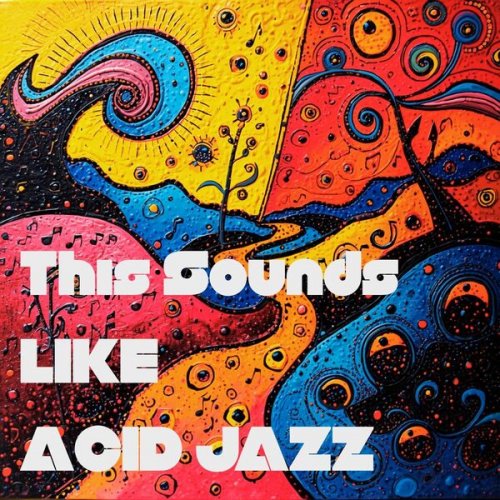
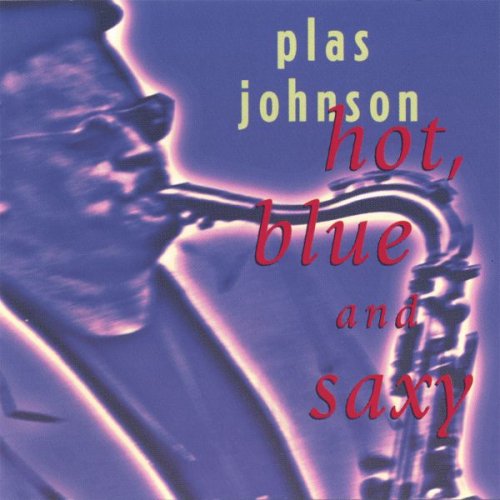
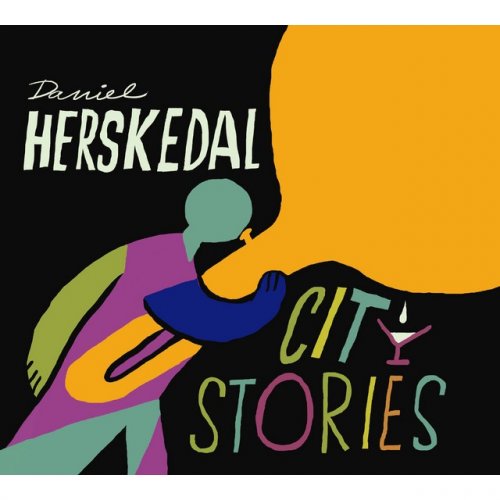
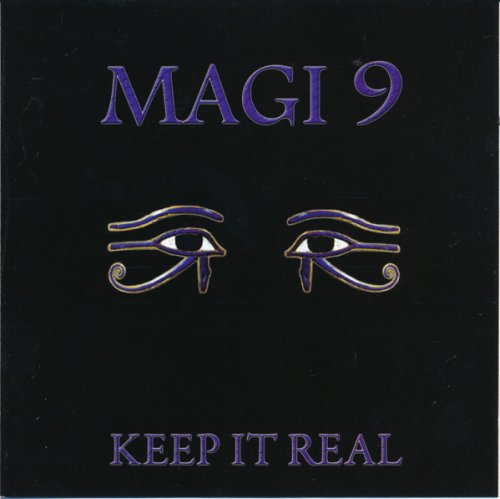
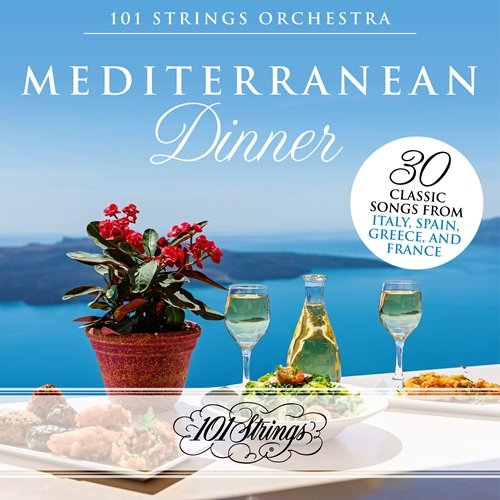
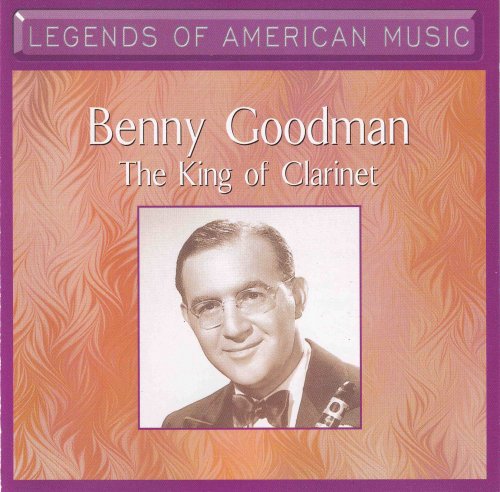
![VA - Naive Melodies (2026) [Hi-Res] VA - Naive Melodies (2026) [Hi-Res]](https://www.dibpic.com/uploads/posts/2026-01/1769024205_ifnetlpx11whb_600.jpg)
![Balkan Union - Pilgrimage (2026) [Hi-Res] Balkan Union - Pilgrimage (2026) [Hi-Res]](https://img.israbox.com/img/2026-01/22/2lfw4yvglg0vewl9vajw5143q.jpg)
